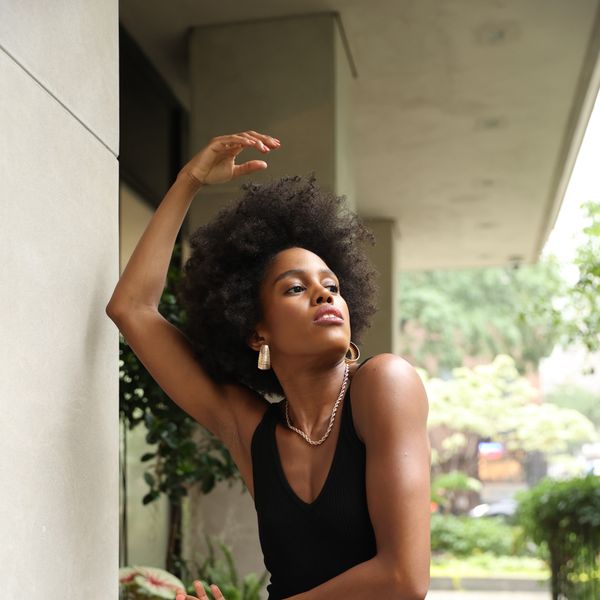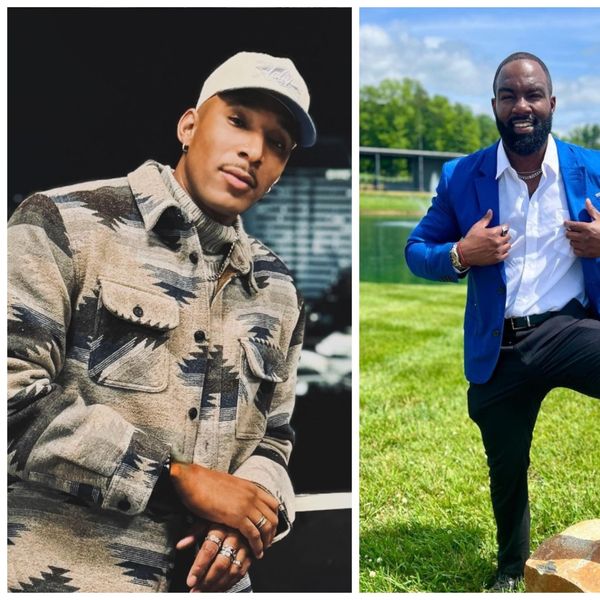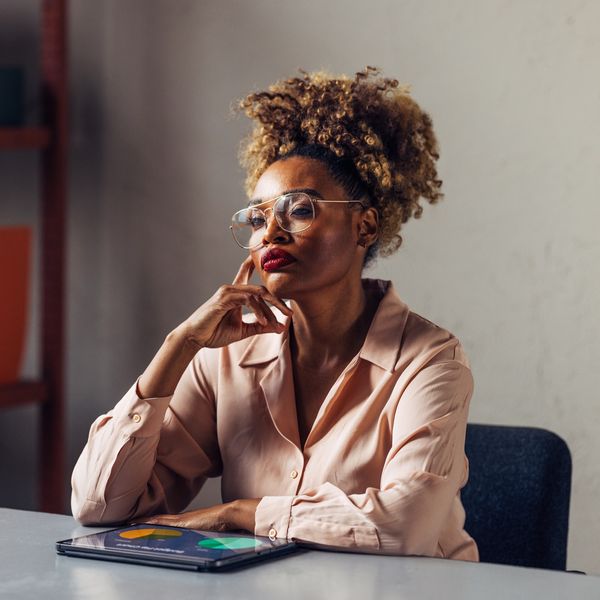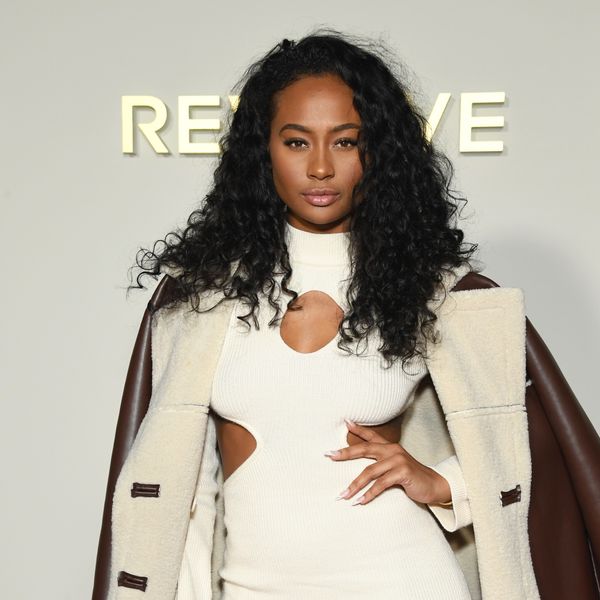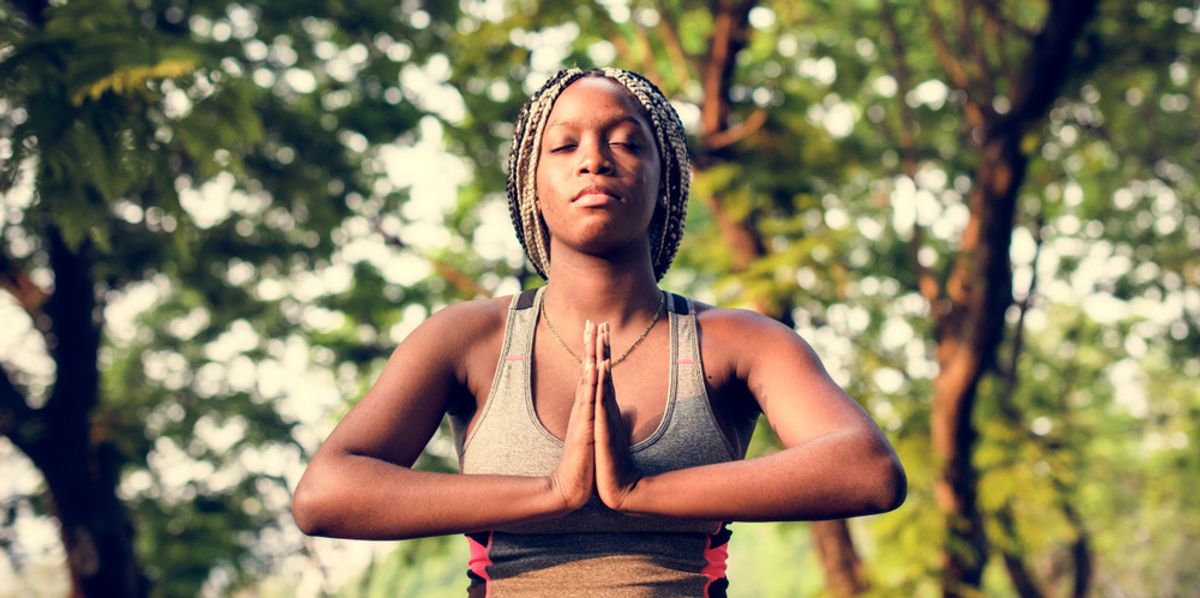
Living With PCOS As A Black Woman
Heavy periods, weight gain, mood changes, pain, and acne. Sounds like normal symptoms of that dreaded time of the month, right? Maybe. But it actually could be more than that. It could also be symptoms of a hormonal disorder called polycystic ovary syndrome (PCOS). PCOS is a condition that affects a woman's ovaries. Women who have PCOS often experience irregular periods (infrequent or prolonged) due to PCOS' effect on the reproductive hormones. Doctors aren't exactly sure what causes PCOS and in fact many women don't even know they have it and often chalk the symptoms they are experiencing up to menstrual cycle symptoms.
PCOS affects women of all races and ethnicities who are of reproductive age. In fact, one study's findings "suggests that there are no racial or ethnic influences on the prevalence of PCOS." So, while black women are not necessarily more prone to PCOS, they are often misdiagnosed or misunderstood. "Most of my PCOS warriors are white or Hispanic. I've found that black women have had trouble with their diagnosis. They have no idea that they have it. In the black community, a lot of us aren't even aware of what PCOS is or how to support each other. But as an overall community, we are being recognized more, and more women are doing their research and finding fellow PCOS sisters. We're finding out how to change this stigma of people brushing it off like it's not real," said Alicia W. shared with xoNecole.
September is PCOS Awareness Month and women like Alicia, Mieko, and Tanny are doing their part to educate and bring awareness of the disorder, all while educating women on PCOS. Check out their stories below.
Alicia W.
I remember having severe cramps, like I was on my cycle. Not too long after, I began to think something was wrong. I was trying to Google what was wrong with me until the pain got out of control. It got so bad my boyfriend took me to the emergency room. After arriving at the hospital, I was told that a cyst had ruptured and I was given the diagnosis of PCOS. Before then, I knew something felt a little weird and a little off.
"I was experiencing period symptoms, but they were happening without a period and they were coming more frequently than my period was coming. I brushed off all of those symptoms. I never thought to look into PCOS because I was going to my OB/GYN every year and it never came up."
In terms of treatment, I have been on just about everything you can possibly imagine. So, initially when they diagnosed me, they told me that all I needed to do was lose weight. No medicine, no nothing. I ended up dealing with the same symptoms for two years. I came home and started going to my current OB/GYN. I tried Metformin and it was horrible. It was not for me. It made me sick every time. I even tried to take it off and on along with birth control. But with birth control, my hair growth, also known as hirsutism, was getting worse. I was getting cystic acne and having more pain.
What I'm doing now is Ovasitol. I just started this year and it has been what works best for me by far. It's amazing. Ovasitol is a powder supplement. You mix it in your water or whatever drink you choose. It helps to level out hormones, control cravings, and regulate your cycle. I still have symptoms, but they are more manageable. The only thing you can't really reverse is the hair growth. That's the only thing that has not been managed. Literally after a month of Ovasitol (even without taking it regularly), my period came back after six months of not having one. I also take Goli gummies as well, just as an additional vitamin to help give me some energy in the morning.
"I hope that more black women feel empowered to talk to their doctors about PCOS. As black women, we are completely overlooked because we are traditionally heavier or have more curves. We are immediately told to lose weight which is not the answer for everyone. When we tell them about our symptoms, they attribute it to needing to lose weight. They rarely look into anything else."
One day, I put a little quiz on my Instagram story for women to take to see if they have PCOS symptoms. I received about 35 DMs from black women saying, "Oh my God, I think I have PCOS!" I was thinking what in the world is happening when these women are going to see their doctors? My advice to other women would be to ask questions and be sure they are listening to their bodies. I would also encourage other women to raise awareness because there are so many women out there going through the same thing.
To continue following Alicia's journey, be sure to follow her @lelestyleme.
Mieko B.
After about two years of my partner and I trying to conceive, I finally made an appointment with my OB/GYN and expressed to him my concern of not conceiving. My periods were usually normal. Every now and then, they would be three to five days late but I didn't think too much of it and I also would get painful cramps and heavier cycles with larger than usual blood clots. I also noticed the last few years I've been getting more unwanted body hair which was pretty embarrassing. I even found myself hiding it from my partner.
"It did take a few appointments, bloodwork, HSG, and then finally my laparoscopic and hysteroscopy procedure for my doctor to finally say that it was PCOS. It seemed like my doctor did not want to diagnose me before getting all of those tests done but after doing research myself and matching up some symptoms, that's when I pretty much self-diagnosed myself."
Since I was only diagnosed a month ago, so far I've mainly been focusing on regulating my diet, being that I want to tackle this the most natural way possible. I've cut down on my sugars and white flour. I've increased my omega-3 intake and other supplements. I've also increased the amount of light exercises I do and added more stretching to my regimen.
After being diagnosed with PCOS, the effects have been more emotional than physical. Although I do have physical symptoms more around ovulation and my period, it doesn't affect me as much as the mental side. The emotions of knowing that I have been diagnosed with this and that it will take me more effort to finally conceive, it has become a bit discouraging and I tend to blame myself.
"Every month, for pretty much the past two years, I cry every time my period comes and this was even before officially being diagnosed because I just knew something was wrong. I do feel that I am more prone to have mood swings and I have a major shift in my emotions and little things make me cry easily now."
My words of advice to other black women living with PCOS is to stay strong! When you're dealing with something so personal, you tend to question why this is happening to you. Never blame yourself or beat yourself up over this diagnosis, try your best to come up with a regimen that will specifically help you and your symptoms and stick to it. Most importantly, remember that you are not alone.
To continue following Mieko's journey, follow her @Scxbanx.
Tanny B.
I experienced a wrath of vaginal and hormonal issues that had an impact on my health. I was extremely anxious, moody, had a low libido, dry scalp, skin problems, my periods were irregular or would appear for more than 14 days, and one of the biggest detectors for me was consistent vaginitis due to my hormone imbalances.
"I went from WAP to DAP, had a painful vagina, and recurrent bacterial vaginosis no matter what I did to cure it. I tried at-home remedies, over-the-counter drugs, I even meditated on my vagina but nothing worked."
I visited several physicians until I found one with the patience to investigate my health problems. I was diagnosed with PCOS in 2017, after an extensive hormone and blood test which showed disproportionate hormones and excess in androgen. To this day, it is rare to find a physician to diagnose and provide real PCOS advice. I didn't receive any advice or helpful info after my diagnosis.
After I received my diagnosis, I wasted no time to do my own research on how I could improve my symptoms. At the moment, I take several vitamins and supplements to improve my well-being and fight PCOS symptoms. Myo & D-Chiro Inositol, Vitamin D, Omega-7, a probiotic, a multivitamin, and maca root powder, to name a few. I've realized it's so important to stay active and maintain a PCOS-friendly diet.
I cope with my PCOS roller coaster by venting through my blog vtalksgyn.com. It's the best way to connect with other women and to let other black women know that they are not alone in the fight. I also struggle with low libido which has a direct affect on both my mental and sexual health. For a long time, I had no sexual confidence because I felt like my vagina just didn't work. Throughout the years of experimenting with various supplements, products, foods, and birth control, my symptoms are kept at bay by staying true to my daily regimen. I have a strong support system of friends who work to understand my journey which makes my day-to-day hardships just a little easier.
"When I received the news that I had PCOS, I cried for an entire week and had absolutely no guidance. In my mind, it meant I would never have children and that my vagina was broken. One day, I decided that I would not be defeated by my disorder."
I want to scream, "PCOS is not the final destination!" Take control of your symptoms and become stronger than your excuses! Take one day at a time, listen to your body, and do what makes you feel best. We have to support one another and continue to have these types of conversations so none of us feel alone.
To continue to follow Tanny's journey, be sure to follow her @Vtalksgyn.
Featured image by Shutterstock
- How PCOS Strengthened This Couple's 4-Year Marriage - xoNecole ... ›
- Women Are Using Yoni Steams To Heal Themselves From ... ›
- Naturally Reverse PCOS Symptoms - xoNecole: Women's Interest ... ›
- What Is Yoni Steaming? Guide - xoNecole: Women's Interest, Love, Wellness, Beauty ›
- Irregular Periods: Foods To Eat To Regulate - xoNecole: Women's Interest, Love, Wellness, Beauty ›
- What Is PCOS? Symptoms, Diagnosis, Managing Diet Lifestyle - xoNecole: Lifestyle, Culture, Love, Wellness ›
- Living With PCOS Taught Me to Redefine My Standards of Beauty ... ›
- The problem with PCOS | Novant Health | Healthy Headlines ›
- PCOS: Black women are being let down by the NHS ›
- Black Women Turn to Internet to Battle Mystifying Illness • EBONY ›
- What Is PCOS? Understanding Polycystic Ovary Syndrome - Black ... ›
Erica Green is a Clinical Research Associate, blogger, and a sneakerhead. She has a love for all things women and she's pretty sure that women are God's greatest creation. Connect with her on Instagram @ erica_britt_ or www.lovethegspot.com
This article is sponsored by Hulu.
UnPrisonedhas returned for its highly anticipated second season, delving deeper into the complex dynamics of the Alexander family.
The series premiere comes a year after its debut season garnered rave reviews from fans and critics and earned record-breaking ratings for Hulu's Onyx Collective brand. UnPrisoned's success can be attributed to its raw, relatable themes and comedic appeal.
Inspired by creator Tracy McMillan's life, the show follows Paige (Kerry Washington), a therapist and single mother whose life takes an unexpected turn when her father, Edwin (Delroy Lindo) --who was released from prison-- moves in with her and her teenage son, Finn (Faly Rakotohavana).
Throughout UnPrisoned's first season, viewers witnessed how Edwin's incarceration deeply affected Paige's life and relationships. In the series, Paige unpacks her trauma through interactions with her inner child and her online followers. Meanwhile, Edwin is overcoming specific struggles with his own past that led to his life of crime, including a dysfunctional upbringing and his mother's arrest. As the Alexanders attempt to reconcile, new challenges arise.
This new season promises to further explore their unconventional family dynamic. Here are several compelling reasons why season two of UnPrisoned should be on everyone's watchlist.
The Alexander Family Life Is Still In Shambles
UnPrisoned's second season resumes where the series left off, with Paige grappling with the fallout from her troubled therapy practice and Edwin navigating life independently after moving out. Meanwhile, Finn faces his own challenges. The teenager is battling anxiety and seeking information about his father—a topic Paige avoids discussing.
The Alexander Family Are Attending Therapy To Resolve Their Underlying Issues
Amid the chaos in their lives, the Alexander family decides to mend their bond by confronting their past traumas. They seek professional help and attend therapy sessions with a “family radical healing coach,” played by John Stamos, a new cast member. This collective effort aims to unravel the complexities of their shared history and strengthen their relationships.
The process of unraveling each character's internal conflicts and their potential impact on future relationships may clash with Paige's textbook therapy approach. While Paige is used to being in the therapist's seat in both career and family, this forces her into the unfamiliar role of a patient during therapy sessions. This shift would compel her to look in the mirror and try a radically different approach.
The Alexander Family Learned A Big Lesson During A Therapy Session
In therapy, the Alexanders are tasked with addressing their individual traumas to salvage their remaining relationships. One of the family therapist’s eccentric suggestions was an exercise involving a family wrestling match. During this session, Paige faces tough questions about her refusal to share information about Finn's father.
While it's unclear whether this scene is reality or fantasy, the image of the family duking it out in the ring certainly makes for hilarious yet compelling television.
Paige Tries Dating Again Following Failed Relationships
Amid her life's chaos, Paige decides to step back into the dating field. However, her many attempts have left her with mixed results. The dating apps have turned out to be a fail, and an outing with her ex Mal (Marque Richardson), who is also her father's parole officer, doesn’t go quite as expected after he brings an unexpected guest – his new girlfriend.
The situation takes an awkward turn when Mal's new partner learns why the former couple split, partly due to Paige's self-sabotage.
UnPrisoned Is A Perfect Balance Of Comedy And Drama
As a dramedy, UnPrisoned takes a comedic approach to its heavy subjects. The show takes us on a ride with Paige's dating misadventures and navigating a friendship with her ex.
Other lighthearted moments include Edwin's attempts at CPR based on online videos and, of course, the antics of the Alexander family's unconventional new healing coach.
The second season of UnPrisoned is now available on Hulu.
UnPrisoned | Season 2 Trailer | Hulu
Feature image courtesy
These Tips Will Keep Foreplay From Becoming Boring AF (No Pun Intended)
As a writer, I happen to like quotes A LOT. When it comes to the topic of sex, specifically, there used to be a page on Twitter (it’s always gonna be Twitter to me, chile) calledKinky Quotes that I would enjoy checking out from time to time. The reason why is it was good forshowcasing content like “Foreplay. Don’t rush it. Enjoy it.”
INDEED.
Okay, but what if you’ve been in a relationship for a while now, and although the foreplay is still pretty good, the real issue is that it’s also become a bit, well, boring? What do you do? First, don’t overthink it; you’re not in a position that is strange, rare, or anything to be overly concerned about. Second, there are a few things that you and your partner can do to bring a bit more spice back into the foreplay aspect of your sex life.
1. Build Up Anticipation
 Giphy
GiphyI’ve been working with long-term couples for a really long time now — and if there’s one thing that can tank the sex life of people who’ve been having sex for years, it’s not doing what builds up anticipation. At the end of the day, anticipation is all about giving your partner something to look forward to. Sexting does this. Sending your partner an email with a hotel reservation or some out-of-the-blue sexcation plans does this. Calling them to share something that you want to check off of your sex-themed bucket list does this.
Pretty much doing anything that lets them know that you want them to get into the headspace of getting super excited about what you have in store for them, on the sexual tip — that is some of the best foreplay that there is, y’all. So, when’s the last time that you gave your man a preview of what is to come? Hmm…
2. Get Creative with Your Nudity
 Giphy
GiphyUnfortunately, our culture can be so…imbalanced (let’s go with that word) when it comes to sex that many people think it’s impossible to engage in intimacy with someone for years (even decades) on end and still find it to be an absolutely wonderful and fulfilling experience. Meanwhile, there areplenty of studies to support that sex actually gets better, the longer that you are with someone (one study says that it’s around the 15-year mark when things really start to soar!). The thing that you should avoid is falling into a rut — being lazy about intimacy, looking crazy while going to bed (y’all know what I am talking about), and not “dressing up” the gift sometimes.
I can’t tell you how many husbands I have worked with who have told me that they never get tired of their wife’s body (like…ever); what they do get sick of is no lingerie or creativity when it comes to her “sexual presentation.” Date night with no drawers on. Watching television in a sheer baby doll get-up. Celebrating a goal that he’s reached with nothing but a bow on when you come to bed. You get what I mean, right? He chose you. He wants you. Get creative with your body when it comes to intimacy sometimes, though. That way, he’ll never see you coming (well…until…you know. LOL!).
3. Leave Touch Out of It (Initially)
 Giphy
GiphyWhile once reading an article on Bustle’s site about where the term “blow job” came from (it’s a semi-long explanation; you can check it outhere), there’s a sentence that says, “The roots of the term ‘blow job’ began a bit earlier than this, however — in the 17th century, to be exact, when to ‘blow’ meant to bring someone to orgasm.” One definition of blow speaks to what we do with our breath whether it’s whistling, breathing hard, or creating a steady stream of air out of our mouth.
If you do this on your partner’s erogenous zones, it can provide a very flirty yet arousing level of stimulation to where they will want you to touch them as soon as possible. Oh, and if you add some dirty words into the mix, they will damn near be ready to climax the moment even your finger touches their body. Hey, try it. I’m absolutely not exaggerating.
4. Kiss Everywhere…BUT the Mouth (Again, Initially)
 Giphy
GiphyEven though some people don’t like to kiss (check out “Umm, What's Up With These People Who Hate Kissing?”), the rest of us? We want it as much as possible! There isa scientific reason for why that is the case too. When you kiss someone (especially in the mouth), it releases feel-good and bonding hormones and chemicals including dopamine, oxytocin, and serotonin; not to mention the fact that it can also help to reduce stress. And while kissing does feel absolutely amazing, remember that the focus here is to “pregame” stimulation.
So, if you really want to get your man riled up, avoid his mouth (at first) and even his penis and opt for turn-on spots instead.The wetness of your mouth, the softness of your lips, and the texture of your tongue along his neck, around his ears or gently grazing his back? Girl, I’m getting a little hot ‘n bothered just talking — well, writing — about it.
5. Stay Out of the Bed
 Giphy
GiphyIf there are two things that couples can find themselves getting really lazy about (if they’re not careful), it’s when they have sex and where. As far as the “when” goes,although reportedly, guys tend to prefer it in the morning (I mean, morning wood…makes sense) and women do late at night, most couples will admit that there is usually a time when they have it the most (especially if they’ve got young children — check out “How To Make Sex Easier (& More Fun) When You've Got Kids”) as a way of “meeting in the middle.” For example, if for you and your man,that’s 10 p.m. and it’s pretty much that way, every time, that can get to become boring, simply because no anticipation is necessary; you know what’s coming.
Same thing goes for always having sex in the bed. Even though it’s comfortable and accommodating to most sex positions, trying other places (at least for foreplay) can cultivate a feeling of newness and excitement. Whether it’s on the kitchen floor, in your car (when it’s in the garage), in the shower (check out “So, This Is How To Make Shower Sex So Much Better”), in your closet (some people really like the closeness of it) or, what appears to be most folks’ favorite spot,the living room sofa (go figure, chile) — get out of the bed sometimes. The bed is comfy, no doubt. It’s also predictable as hell.
6. Have a Foreplay Staycation
 Giphy
GiphyIt honestly floors me, just how many married couples I know who either haven’t taken a romantic vacation in years or (what in the world?!) haven’t done it since their honeymoon. To that, I’ll just say this: there was once a study conducted of 2,000 couples. It was revealed that of those who felt like their relationship had lost its spark, 42 percent of them were able to get it back by spending some quality time together while taking a leisure trip (without the kids). To me, this makes all of the sense in the world because romantic vacations are designed to “get off of the grid” and focus, solely, on you and your partner’s needs.
So, if you are one of those couples who doesn’t have a trip, just for you and your man, on the docket for some time this year, here’s your sign that you need to figure something out — ASAP. And what if your money is tight? What should you do in the meantime? How about a foreplay staycation? Plan 24-48 hours where you and your man do nothing but kiss, lick, and touch without any penetration involved. Play sex games. Dance naked. Come up with (new) safe words. After a day or two of nothing but this, you will be ready to explode once it’s time to actually have sex with each other!
7. Play Your Own Version of “Hot, Warm, Cold”
 Giphy
GiphyTemperature play plays a solid role in sexual pleasure; that’s why I’ve written articles like “Hot Sex: 10 Super Sultry Reasons To Bring Wax Play Into Your Bedroom” for the platform. Anyway, aside from the fact thatit’s pretty damn hilarious that 69 degrees is the ideal room temperature for intimacy (umm, if you catch my drift), a big part of the reason why playing around with hot, warm, and cold temps is so effective is because your nerves respond,sometimes drastically so, to variations in them.
I mean, when you stop to consider that there are8,000 nerves in a clitoris and 4,000 in a penis, imagine what some ice would do during oral sex. Or, how about heating up a sex toy that’s made out of glass or metal in some boiling water, letting it cool just a bit, and running that up and down each other’s erogenous zones? If you do this while being blindfolded, there really is no telling where the peak levels of stimulation could take you!
8. Focus on Upping the Ante on Your Partner’s Stimulation (As They Do the Same for You)
 Giphy
GiphyI’ve already referenced the word “stimulation” a few times. To stimulate is “to rouse to action or effort, as by encouragement or pressure; incite.” Some synonyms include arouse, inspire, spark, activate, energize, enflame, support, urge — and motivate (cue Kelly Rowland’s song, "Motivation"). And so, keeping all of this in mind, when it comes to foreplay with your partner, how much effort do you put into stimulating him — into inspiring him, energizing him, motivating him…yes, sexually?
Something that I am a big-time believer of is, it’s hard to fall into a sexual rut, if the goal that BOTH PEOPLE have is to always outdo themselves, damn near every time that they come together. That said, how can you “out-inspire” him with your compliments? How can you “out-energize” him with a creative meal that’sfilled with aphrodisiacs? How can you “out-motivate” him with some new ideas that you’ve researched while you were at work?
When it comes to both foreplay and sex, “applying pressure” can be a ton of fun — when you see yourself as your own competition as far as taking your partner to new heights in the stimulation department.
9. Be Unpredictable
 Giphy
GiphyUnpredictable can go a lot of ways. In the context of what I’m referring to, I’m not talking about being fickle, erratic, and unreliable. Nah, what I mean is, be intentional about having a few tricks up your sleeve that your partner would never see coming.
An example of this comes from a song from a local legend here, Shannon Sanders (if you know, you know). He once wrote a song entitled “Interstate” and the intro starts off with him saying, “What you doin’? Not you. Didn’t think you were the type.” Yeah, you can read between the lines (or click on the hyperlink to the title) to get what he’s talking about yet I’m pretty sure that what made the experience, 50 times greater, is she did something that was outside of the norm. When it comes to foreplay and sex — that is typically the case. #wink
10. Switch the Energy Up
 Giphy
GiphyForeplay can — and should — have different themes from time to time. One time, focus on being romantic (rose petals and toasting each other). Another time, lean into being kinky (where are your handcuffs and bondage rope?). Still, another time, discuss a fantasy that you each want to fulfill. Then play dress-up as you role play. Record (the audio) of yourselves having sex one day; then play it another day — during foreplay.
Spoon naked and talk about all of the things that you adore about each other’s bodies. Get some oral sex dice (like thesehere) and see where throwing the dice will take you. Y’all, energy is such a big part of foreplay and sex, and the more you master switching it up, the more you and your partner will look forward to coming — and cumming — together for years to come. No doubt about it, sis.
Let’s make things inbox official! Sign up for the xoNecole newsletter for love, wellness, career, and exclusive content delivered straight to your inbox.
Featured image by Giphy



